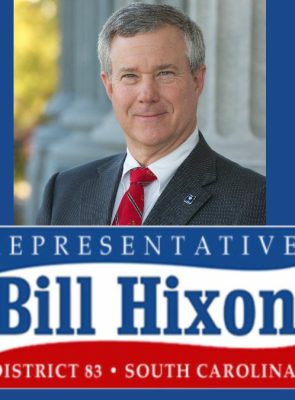Dear Friends,
The House returned from our two-week Easter furlough to exciting news last week that Boeing plans to greatly expand its presence in North Charleston.
The success of Michelin, BMW, Bridgestone and now Boeing has proven that our state has the best workers in the world and a government willing to work in a bi-partisan manner to support new business. Republicans have fought tirelessly to improve South Carolina's business climate as we compete against the world for jobs. Our efforts are being rewarded, and political leaders of both parties realize the job creation knows no party distinction.
In less than 4 years, Boeing has invested well over $1 billion and created 6,000 jobs. This week, our colleagues in the Senate gave approval to a $120 million bond package to assist the company in a major expansion. In exchange, Boeing plans to hire 2,000 additional employees and must invest another $1 billion in its facility in North Charleston. Boeing must meet its hiring and investment goals by 2020 or the state can recoup its investment.
There are some legitimate concerns about the use of government incentives for private business, but nobody should argue with incentives on a project this big for an industry that neither has "mom and pop" businesses in it nor has a presence in our state. It is simply the only way to compete when other states – and countries all over the world – are doing the same thing.
There are not enough incentives int he world to make a company come to an area if they cannot attract quality employees. Our people are our biggest asset. You are our biggest asset. We know that and have been selling that to companies all over the world.
The world is waking up to South Carolina. We are open for business!
In order for me to have a strong voice in Columbia, I have to communicate with my constituents. And that is you! My website, newsletters, mailers and Facebook are the communication tools that I use. It takes extra time, staff and campaign funds to maintain them.
If you would like to contribute, please mail a check to Hixon for House, P.O. Box 7927, North Augusta, SC 29861, or contibute online by going HERE.
LEGISLATIVE UPDATE – May 1, 2013
SC Measure Fights New Home Rental Tax:
 The SC Department of Revenue recently increased efforts to impose a 2% Accomodations Tax on those people in Aiken County and elsewhere who rent their homes for a short period of time. The Department of Revenue targeted those renting homes during the Master's Golf Tournament. The House unanimously passed by bill, H.3767, with a vote of 107-0, preventing the collection of that tax for the first 15 day rental period of your primary residence. The proposal now awaits Senate committee review, having easily cleared the House chamber before the May 1st Crossover Day Deadline.
The SC Department of Revenue recently increased efforts to impose a 2% Accomodations Tax on those people in Aiken County and elsewhere who rent their homes for a short period of time. The Department of Revenue targeted those renting homes during the Master's Golf Tournament. The House unanimously passed by bill, H.3767, with a vote of 107-0, preventing the collection of that tax for the first 15 day rental period of your primary residence. The proposal now awaits Senate committee review, having easily cleared the House chamber before the May 1st Crossover Day Deadline.
A State Department of Revenue official left me a message assuring me that they would not be sending any letters to property owners directing them to pay the accommodations tax and I want to make sure it stays that way.
Reforming the Real Estate Commission:
The Real Estate Commission is a donor licensing board, meaning that realtors license fees are not kept by the Real Estate Commission to serve real estate practitioners and their clients, rather they are dispersed throughout the entire Labor, Licensing and Regulation (LLR) structure to support five insolvent licensing boards and functions. Unfortunately, the public is increasingly at risk due to the inability to adequately regulate and police licensed professionals and real estate are not receiving benefits to which they are entitled.
South Carolina Realtors (SCR) supports legislation H.3771 that has passed through the House and crossed over to the Senate. This important legislation does the following:
- Requires the Real Estate Commission (REC) to have at least five dedicated investigators
- Requires any staff appointments made by LLR to the REC be done with the advice and consent of the REC
- Requires the REC Administrator to hold an active real estate license with at least five years experience
- Requires the election of commissioners to be held with public notice with more transparency
- Adds a new commissioner for the new 7th Congressional District
House Approves Bill Important to Realtors:
The House debated several bills last week important to Realtors and approved them so that they meet the critical May 1st crossover deadline. The House gave a third and final reading to H.3093, the Abandoned Buildings Revitalization Act. The bill provides tax credits for rehabilitation of abandoned buildings. The House also approved H.3027, legislation that allows active-duty military to maintain the 4% assessment ratio when they are subject to a chance in duty station. H.3774, a resolution directing state agencies to renew permit and development approvals that have not been renewed at no cost, received third and final reading Thursday afternoon. Each of these bills now cross over to the Senate for consideration. Lastly, the House gave a second reading to H.3145, allowing the expedited tenant ejectment under certain circumstances, by a 99-4 vote. This bill must receive theird reading by Wednesday to meet the crossover deadline.
SC Residential Builders Commission License Renewal:
The House amended, approved, and sent to the Senate H.3869, a bill revising the renewal of licenses issued by the SC Residential Builders Commission. The legislation makes the renewal period biennial, rather than annual, and requires a licensee seeking renewal to submit a certificate of compliance with continuing educational requirements. The legislation establishes specific requirements for mandatory continuing education or examination required of a licensee, and provides that no additional continuing education or examination may be required by a county or municipality. The legislation requires residential specialty contractor licensees to complete certain continuing education approved by teh commission, and provides that a residential specialty contractor who has completed continuing educational requirments in addition to other existing requirements is exempt from related additional examinations required by a county or municipality.
Restaurant Carry Bill :
The Senate broke their gridlock on S.308, guns and alcohol in restaurants and bars, Tuesday night. This bill has been at the top of the Senate Special Order calendar for a month, with little progress made on the bill. Ultimately, Senator Massey offered a compromise amendment that would prohibit carrying a gun in a restaurant between midnight and 5 a.m. or entering and remaining in the area of a business devoted to dispensing and serving alcohol if carrying. In addition, a business can post a no concealed weapons allowed sign. The amendment also provided for harsher penalties for violation. The amendment was adopted by a vote of 26-13. All other amendments were withdrawn and the bill was given a third reading.
Retail Theft Operations:
The House amended, approved, and sent to the Senate H.3602, a bill establishing criminal offenses targeting retail theft operations. The legislation creates the felony offenses of committing and conspiring with another to committ retail theft, amounting to more than $2,000 over a 90-day period, with the intent to sell the stolen property or to place the stolen property in the control of a retail property fence. A fence is a person or business that buys retail property knowing or believing the property is stolen. The legislation creates a felony offense relating to stealing goods or merchandise from a merchant by affixing a product code created for the purpose of fraudulently obtaining goods or merchandise at less than actual sales price. The legislation creates an offense for the use of a false or altered identification to commit retail theft by way of a refund. Violations are a misdemeanor if the value is less than $2,000, and violations are a felony if the value is $2,000 or more. Regardless of the value involved, if an offender has two or more prior convictions, the third violation is a felony. When a defendant is ordered to make restitution by a magistrate or municipal court, this legislation requires the court, upon a motion, to hold a hearing to require a defenant who is in default to show cause why his default should not be treated as a civil judgment lien attached. A magistrate may convert unpaid court ordered payments into a civil judgement.
Enforcement and Prosecution of Identity Theft Offenses
 The House concurred in Senate amendments to H.3248, a bill relating to the enforcement and prosecution of identity theft offenses, and enrolled the legislation for ratification. The legislation enhances identity fraud and financial identity fraud provisions by establishing more expansive criteria for personal identifying information and financial resources that are to be used in determining whether a fraud has been committed. The legislation provides that the revenue for the prosecution of identity fraud and financial identity fraud offenses is in the county in which the victim resided at the time the information was obtained or used. Conforming language contained in financial transaction card crime is added to provide that, in a prosecution for a violation of identity fraud offenses , the state is not required to establish and is not a defense that some of the acts constituting the crime did not occur in this state or wihin one city, county or local jurisdiction. The legislation revises the provision that allows someone who learns or reasonably suspects that he is the victim of identity theft to initiate an investigation by reporting to a local law enforcement agency that has jurisdiction over his actual legal residence, so as to eliminate the law enforcement agency's option of referring the investigation to another law enforcement agency where the crime is committed.
The House concurred in Senate amendments to H.3248, a bill relating to the enforcement and prosecution of identity theft offenses, and enrolled the legislation for ratification. The legislation enhances identity fraud and financial identity fraud provisions by establishing more expansive criteria for personal identifying information and financial resources that are to be used in determining whether a fraud has been committed. The legislation provides that the revenue for the prosecution of identity fraud and financial identity fraud offenses is in the county in which the victim resided at the time the information was obtained or used. Conforming language contained in financial transaction card crime is added to provide that, in a prosecution for a violation of identity fraud offenses , the state is not required to establish and is not a defense that some of the acts constituting the crime did not occur in this state or wihin one city, county or local jurisdiction. The legislation revises the provision that allows someone who learns or reasonably suspects that he is the victim of identity theft to initiate an investigation by reporting to a local law enforcement agency that has jurisdiction over his actual legal residence, so as to eliminate the law enforcement agency's option of referring the investigation to another law enforcement agency where the crime is committed.
Veterans Treatment Court Program Act
The House amended, approved and sent to the Senate H.3014, the "Vetrans Treatment Court Program Act" to address the criminal justice system's encounters with veterans who have returned from their military service having sustained traumatic brain injuries or suffering from service-related mental health impairments, such as post-traumatic stress disorder, depression, anxiety or acute stress. This legislation provides authority for each circuit solicitor to establish a verans treatment court program, subject to the availablity of funds, to divert qualifying nonviolent military veteran offenders away from the criminal justice system and into appropriate mental health and substance abuse treatment programs, thereby reserving prison space for violent criminals and others for whom incarceration is the only reasonable alternative.



